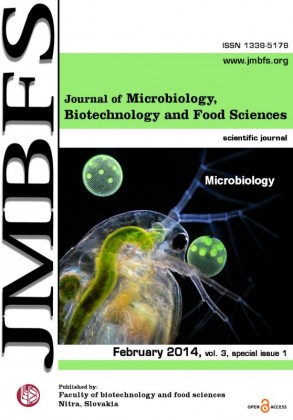PRODUCTION OF EXTRACELLULAR KERATINASE BY CHRYSOSPORIUM TROPICUM AND TRICHOPHYTON AJELLOI
Keywords:
Chrysosporium tropicum, Trichophyton ajelloi, feather, keratinAbstract
Keratinous wastes constitute a troublesome environmental contaminant that is produced in large quantities in companies processing of poultry and their further use has ecological significance. We can use for degradation of keratinous wastes enzymes or strains, which produce these enzymes. The aim of this study was isolation of keratinophilic fungi from the soil samples and optimalization of culture conditions of keratinase producing strains in vitro. For the isolation of our strains, we used hair - baiting method. From the all isolated strains, we used for other screening Chrysosporium tropicum (JK39) and Trichophyton ajelloi (JK82). Production of keratinase we monitored with different time of cultivation (7th, 14th, 21th days), sources of carbon (glucose, fructose, mannitol, sucrose), concentration of carbon sources (1%, 2%) and cultivation temperature (20, 25, 30, 37ºC). Keratinase production was studied in a liquid medium containing chicken feathers as a source of keratin. We recorded the maximum production of keratinase (10.51 KU/ml) by Chrysosporium tropicum on 21th day of incubation with 1% glucose at 25ºC.Downloads
Download data is not yet available.
Downloads
Published
2014-02-01
How to Cite
KaÄinová, J., TanÄinová, D., & Medo, J. (2014). PRODUCTION OF EXTRACELLULAR KERATINASE BY CHRYSOSPORIUM TROPICUM AND TRICHOPHYTON AJELLOI. Journal of Microbiology, Biotechnology and Food Sciences, 3(special issue 1 (Microbiology), 103–106. Retrieved from https://office2.jmbfs.org/index.php/JMBFS/article/view/7602
Issue
Section
Microbiology
License
Copyright (c) 2014 Jaroslava KaÄinová, Dana TanÄinová, Juraj Medo

This work is licensed under a Creative Commons Attribution 4.0 International License.
All papers published in the Journal of Microbiology, Biotechnology and Food Sciences are published under a CC-BY licence (CC-BY 4.0). Published materials can be shared (copy and redistribute the material in any medium or format) and adapted (remix, transform, and build upon the material for any purpose, even commercially) with specifying the author(s).

